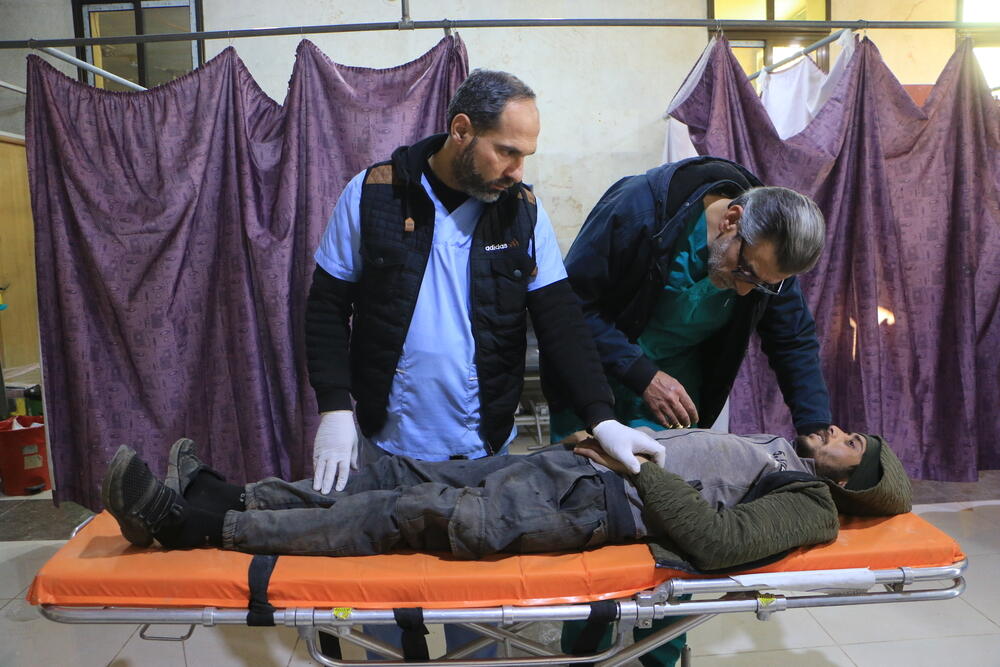Syria: "Hospitals are full of wounded and dead – the needs are immense"
The earthquakes that hit Syria and Turkey (Türkiye) on 6 February have so far claimed more than 36,000 lives.
In northwest Syria, Médecins Sans Frontières / Doctors Without Borders (MSF) teams have been operating an emergency response since the early hours of the disaster.
Their objective: to support hard-hit hospitals and provide medical and material aid to people affected. A large part of MSF’s 500 staff members in Syria have been deployed as part of this.
The MSF hospital in Atmeh, which usually specialises in caring for severe burns, has donated a large amount of its medical and non-medical supplies to other healthcare facilities in the region, as well as dispatched its surgeons to reinforce staff numbers at some of the worst-affected hospitals.
“On 6 February, we quickly understood that we were facing a catastrophic situation," says Mohammad Darwish, the deputy director of MSF’s Atmeh Hospital.
“The destruction was massive in the area. We launched our emergency plan less than three hours after the first earthquake and put our staff on alert.”
Teams in Atmeh have started to send medical equipment to around 10 hospitals across the region, including in Bab al-Hawa, Darat Izza, Idlib and Atarib.
“All the hospitals were overwhelmed, including ours,” explains Samih Kaddour, who, along with his brother Moheed, runs a local hospital that specialises in orthopaedic and reconstructive surgery.
“The MSF teams were the first to help us and to share their resources. They gave us materials, including those needed for making casts and sterilising wounds.
“We received 800 patients in the emergency room, 250 of whom needed surgical treatment. Even today [Saturday 11 February], the wounded continue to flow in.”
Sadly, the widely acknowledged window for finding survivors is now coming to a close.
Surgeons and ambulances
MSF surgeons from Atmeh were dispatched to specific healthcare facilities across the region to support teams dealing with a large number of injured patients.
“I went to a hospital located close to the border with Türkiye,” says Dr Mohammad Zaitoun.
“Due to the closure of the border and the impossibility of receiving external support or transferring the wounded, immense pressure was placed on us. There were many wounded people and the medical staff were exhausted. We did our best with the teams from both hospitals.
“As a surgeon, I was in the operating room. We had never witnessed such an influx of wounded, except perhaps during the bombardments or massacres that took place in the region.”
Get urgent updates by email
Never miss an update from the frontlines of natural disasters, conflict zones and epidemics with our monthly email newsletter.
MSF ambulances from the Atmeh Hospital were also involved in the emergency response, making it possible to transfer patients between the overwhelmed healthcare facilities.
MSF mobile clinics – already operating in the area – adapted their intervention plans to the situation and were dispatched to places where earthquake survivors with gathering.
The teams that run these mobile clinics have been working for several years to provide healthcare to people living in the region’s many camps that host those displaced by conflict.
The areas they are currently visiting include Sarmada, Kammouneh and Al Dana where many people have lost their homes and are now sheltering.
Border disruption
“We still do not have a clear vision of the situation in the wider area of Atmeh,” says Mohammad.
“We just know that the hospitals are full of wounded and dead people and that the needs are immense.
“The people of the region need everything. We immediately opened our logistics warehouses and distributed hundreds of essential items, but it is not enough. We have donated 2,500 blankets to hospitals for their patients, and hundreds of kits of essential items have been distributed to families.”
MSF teams in the region are drawing on their emergency stock while waiting for international supplies to arrive. However, these efforts have been hampered by the political tensions surrounding this landlocked region.
Until the earthquakes, Bab al-Hawa was the only crossing point for humanitarian aid from Türkiye into northwest Syria.
“Almost a week after the earthquakes, we have not received any help from outside,” says Moheed.
“Support only came from other hospitals, local communities or organisations already present before the disaster. Throughout this, the MSF hospital in Atmeh played an important role.
“However, this response is built on a network of around 20 health structures that regularly support each other. It is now facing certain limits. For example, the impossibility of transferring patients who are in serious condition to Türkiye.”
“Usually, we can transfer our most severely burned patients to appropriate health structures in Türkiye,” explains Mohammad.
“The MSF hospital in Atmeh provides essential care, but also has its limitations and can only adequately care for people with moderate burns. Today, there are no specialised hospital beds available in Idlib governorate, and we cannot cross the border.”
In northwest Syria, the earthquakes have disrupted a region that already has more than two million displaced people living in camps, and where access to healthcare was already difficult.
“Nine days after the earthquakes, we are still mobilised to care for our patients,” says Moheeb.
“We are still performing life-saving surgeries on ‘crush syndrome’ victims – a condition resulting from prolonged compression of the muscles that can have fatal consequences such as kidney failure.
“The situation is indescribable, and, for now, we are alone.”
MSF and natural disasters
Within minutes, natural disasters such as earthquakes, tsunamis and hurricanes can overwhelm an entire population. Thousands of people can be injured or traumatised by the loss of family, friends and homes, while access to clean water, healthcare and transport can be cut off.
MSF has more than 50 years of experience delivering rapid and coordinated medical responses to protect survivors of natural disasters.


